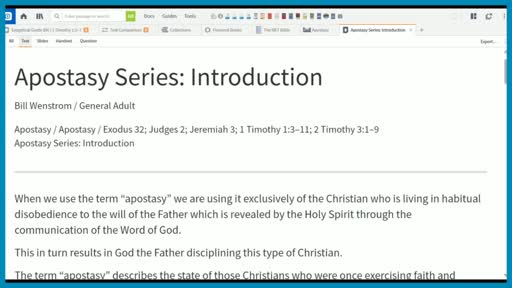Apostasy Series: Introduction

Notes
Transcript
Sermon Tone Analysis
A
D
F
J
S
Emotion
A
C
T
Language
O
C
E
A
E
Social
When we use the term “apostasy” we are using it exclusively of the Christian who is living in habitual disobedience to the will of the Father which is revealed by the Holy Spirit through the communication of the Word of God.
This in turn results in God the Father disciplining this type of Christian.
The term “apostasy” describes the state of those Christians who were once exercising faith and obeying the teaching of the Word of God but are now in the state of unbelief and thus rejecting the teaching of the Word of God.
The child of God who stubbornly refuses to confess their sins to the Father has entered into apostasy.
Therefore, “apostasy” speaks of a Christian doing a “180.”
It speaks of abandoning the orthodox teaching of Scripture.
It speaks of a Christian rebelling against the Word of God and no longer adhering to that which they once believed in.
These Christians do not lose their salvation since the Scriptures are clear that a Christian can never lose their salvation.
Rather these Christians are disciplined by God for their apostasy since they are His children whom He loves and those whom He loves, He disciplines (Heb. 12:4-11).
Apostasy is the turning away from God in rebellion or apathy.
God’s people must beware of inward rebelliousness as much as the outward wickedness that manifests such rebellion.
The apostate Christian must solve his problem with apostasy by confessing their sins (1 John 1:9) which restores them to fellowship with God.
They maintain this fellowship by exercising faith in the teaching of the Word of God which will result in obedience to the commands and prohibitions in the Word of God (Eph. 5:18; Col. 3:16).
Confession of sin followed by faith in the Word of God resulting in obedience to the Word of God constitutes repentance for a Christian.
For the non-Christian, repentance involves exercising faith in Jesus Christ as Savior which results in the imputation of divine righteousness which in turn results in the Father declaring this sinner justified.
During the church age, when we use the term “apostasy” we are using it exclusively of the Christian who is living in habitual disobedience to the will of the Father which is revealed by the Holy Spirit through the communication of the Word of God.
This in turn results in God the Father disciplining this type of Christian.
During the dispensation of the Mosaic Law, when we use this term we are using it exclusively of those Jews who have been declared justified through faith in Yahweh and are in a covenant relationship with Him.
This term means that they are living in habitual disobedience to the will of Yahweh, i.e. the Father which is revealed by the Spirit through the Old Testament Scriptures.
Whether during the Old Testament dispensations or during the church age, the term “apostasy” refers to a believer justified by faith in the Lord initially habitually obeying the Word of God but then doing a 180 and are now going in the opposite direction by living in habitual disobedience to God’s Word.
Believers in apostasy undergo divine discipline whether they lived during Old Testament dispensations or during the church age or during the eschatological dispensations.
The subject of apostasy is dealt with extensively in the Old Testament in relation to the nation of Israel.
Israel was in danger of abandoning God from her earliest days.
The Old Testament frequently warns against apostasy and identifies its likely consequences.
There was a large corporate apostasy in the nation while she was in bondage in Egypt and after she was delivered by the Lord (cf. Ps. 78:9-41; Ex. 32:25-29; Lev. 17:7; 20:1-6; Num. 14:9-12; 14:31-35; 25:1-4; 32:10-11; Deut. 31:16-18; 32:15-21; Ps. 95:7-8; 106:13-33; Heb. 3:15-19).
There was great apostasy in Israel during the time of the judges (cf. Ps. 78:55-64; Jdg. 2:6-23; 8:27,33-34; Neh. 9:26-31; Ps. 106:34-39).
After the death of Solomon, the nation of Israel had a civil war and was divided into a northern kingdom and a southern kingdom.
The latter took the name Judah.
There was apostasy in the northern kingdom of Israel (cf. Hos. 5:3-4; 2 Kgs. 17:7-20; Hos. 1:2; 4:10-19; 7:4).
There was also apostasy in the southern kingdom of Judah (cf. Jer. 3:1-25; 2 Kgs. 23:26-27; 2 Chron. 29:6-9; 30:7-9; Isa. 1:1-6; 30:1-5; Jer. 2:7-13,19-25; 5:5-7; 7:9-15; 9:2; 13:23-27; 17:5-6,13; 23:10-15; Jer. 31:22; Ezek. 6:9; 16:15-42; 23:1-35; Dan. 9:5-14).
The Lord used Assyria to discipline the northern kingdom of Israel for her apostasy in 722 B.C.
The kingdom of Judah was deported to Babylon as a result of her corporate apostasy.
Nebuchadnezzar’s Babylon invaded the southern kingdom three times.
The first was in 605 B.C.
The second in 597 B.C. and the third final one was in 586 B.C.
He destroyed the city of Jerusalem and her temple during his third invasion (Daniel 1:1; 2 Kings 24:1-2, 13; 2 Chronicles 36:5, 6, 7).
There are many passages in the New Testament which speak directly to apostasy in the church (cf. Acts 20:28-30; 2 Thess. 2:3; 1 Tim. 1:3-11; 18-20; 4:1-6; 6:20-21; 2 Tim. 1:15; 2:16-18; 3:1-9; 4:1-4; Tit. 1:10-14; 3 John).